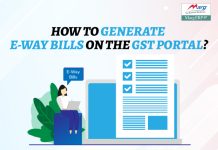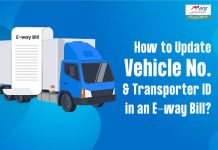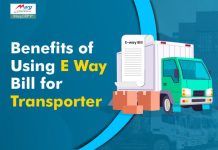When eWay Bill is Not Required: A Comprehensive Guide
The eWay Bill is an electronic document that is generated when goods are transported from one place to another. It serves as proof of the movement of goods and is required for the transportation of goods valued at more than Rs. 50,000. However, there are certain situations where an eWay Bill is not required. In this blog, we will discuss those situations in detail.
What is eWay Bill and when is it required?
Before we discuss when an eWay Bill is not required, let’s understand what it is and when it is required. The eWay Bill is an electronic document that is required when goods are transported from one place to another. It is generated on the GST portal and serves as proof of the movement of goods. The eWay Bill is required for the transportation of goods valued at more than Rs. 50,000, and it is valid for a specific period depending on the distance travelled.
When is an eWay Bill not required?
- Transportation of goods within the same state: If the transportation of goods is within the same state and the value of the goods is less than Rs. 50,000, an eWay Bill is not required. However, if the value of the goods exceeds Rs. 50,000, an eWay Bill will be required.
- Transportation of exempted goods: If the goods being transported are exempted under GST, an eWay Bill is not required. Some examples of exempted goods include books, newspapers, and fresh fruits and vegetables.
- Transportation of goods by non-motorized vehicles: If the goods are transported by non-motorized vehicles such as bicycles, e-rickshaws, or hand carts, an eWay Bill is not required.
- Transportation of specified goods: The government has specified certain goods for which an eWay Bill is not required, regardless of their value. These include goods such as LPG for supply to household and non-domestic exempted category (NDEC) customers, kerosene oil sold under the public distribution system (PDS), and postal baggage transported by the Department of Posts.
- Transportation of goods from customs port, airport, air cargo complex or land customs station to an inland container depot or a container freight station for clearance by customs: If the goods are being transported from a customs port, airport, air cargo complex or land customs station to an inland container depot or a container freight station for clearance by customs, an eWay Bill is not required.
Other Situations When an eWay Bill is Not Required
Apart from the situations mentioned above, there are a few more scenarios where an eWay Bill is not required. These include:
- Transportation of empty cargo containers: If you are transporting empty cargo containers, an eWay Bill is not required, regardless of their value.
- Transportation of personal/household items: If you are moving your personal or household items, such as furniture or electronics, an eWay Bill is not required.
- Transportation of goods for job work: If the goods are being transported for job work purposes, an eWay Bill is not required, provided that the goods are returned to the sender within one year of transportation.
- Transportation of goods for exhibition or fairs: If the goods are being transported for exhibition or fairs, an eWay Bill is not required, provided that the goods are being moved within the same state and are intended for display or use only.
- Transportation of goods by railways: If the goods are being transported by railways, an eWay Bill is not required.
- Transportation of goods for consignor/consignee: If the transportation of goods is being carried out by the consignor or consignee themselves, an eWay Bill is not required. This exemption is only applicable if the consignor/consignee is not a transporter and has not hired a transporter.
- Transportation of goods by Defense/Paramilitary forces: If the goods are being transported by Defense or Paramilitary forces, an eWay Bill is not required.
- Transportation of goods by a courier agency: If the goods are being transported by a courier agency and the value of the goods is less than Rs. 50,000, an eWay Bill is not required. However, if the value of the goods exceeds Rs. 50,000, an eWay Bill will be required.
- Transportation of goods for the purpose of Job Work: If the goods are being transported for the purpose of job work, an eWay Bill is not required, provided that the value of the goods does not exceed Rs. 50,000.
- Transportation of goods within a notified area: If the goods are being transported within a notified area, such as a municipal corporation or an industrial estate, an eWay Bill is not required.
It is important to note that the above exceptions may vary from state to state and may also change from time to time, based on the notification issued by the government. Hence, it is advisable to check the latest regulations before deciding whether an eWay Bill is required or not.
Conclusion
In conclusion, an eWay Bill is not required in certain situations such as transportation of goods within the same state, transportation of exempted goods, transportation of goods by non-motorized vehicles, transportation of specified goods, and transportation of goods from customs port, airport, air cargo complex or land customs station to an inland container depot or a container freight station for clearance by customs. It is important to understand these situations to avoid unnecessary compliance and save time and effort.
Read more useful content:
Frequently Asked Questions (FAQ’s)
Q1.) Can an eWay Bill be generated without an invoice?
No, an eWay Bill cannot be generated without an invoice. The details of the invoice, such as the invoice number and value of the goods, are required to generate an eWay Bill.
Q2.) Can an eWay Bill be used for multiple consignments?
No, an eWay Bill can only be used for a single consignment of goods. If there are multiple consignments, each one will require a separate eWay Bill.
Q3.) What is the validity period of an eWay Bill?
The validity period of an eWay Bill depends on the distance that the goods are being transported. For distances up to 100 km, the eWay Bill is valid for one day. For distances between 100 km and 3000 km, the eWay Bill is valid for three days. For distances over 3000 km, the validity period is extended by one day for every additional 100 km.
Q4.) What happens if an eWay Bill expires during transit?
If an eWay Bill expires during transit, a new eWay Bill will need to be generated for the remaining journey.
Q5.) Is an eWay Bill required for goods that are being returned?
Yes, an eWay Bill is required for goods that are being returned to the supplier, as this is considered a movement of goods. A separate eWay Bill will need to be generated for the return journey.
Q6.) Can an eWay Bill be canceled?
Yes, an eWay Bill can be canceled within 24 hours of its generation, provided that the goods have not yet been transported.
Q7.) Can an eWay Bill be generated without a GST registration number?
No, an eWay Bill cannot be generated without a valid GST registration number. This is because the eWay Bill system is integrated with the GST network, and the GST registration number is used to verify the details of the supplier and recipient.
Q8.) What happens if an eWay Bill is not generated?
If an eWay Bill is not generated when it is required, it can lead to penalties and detention of the goods by the authorities.
Q9.) Can multiple eWay Bills be generated for the same invoice?
No, only one eWay Bill can be generated for each invoice.
Q10.) Is an eWay Bill required for the movement of exempted goods?
No, an eWay Bill is not required for the movement of goods that are exempted from GST or for goods that are not considered as supply under the GST law.




















